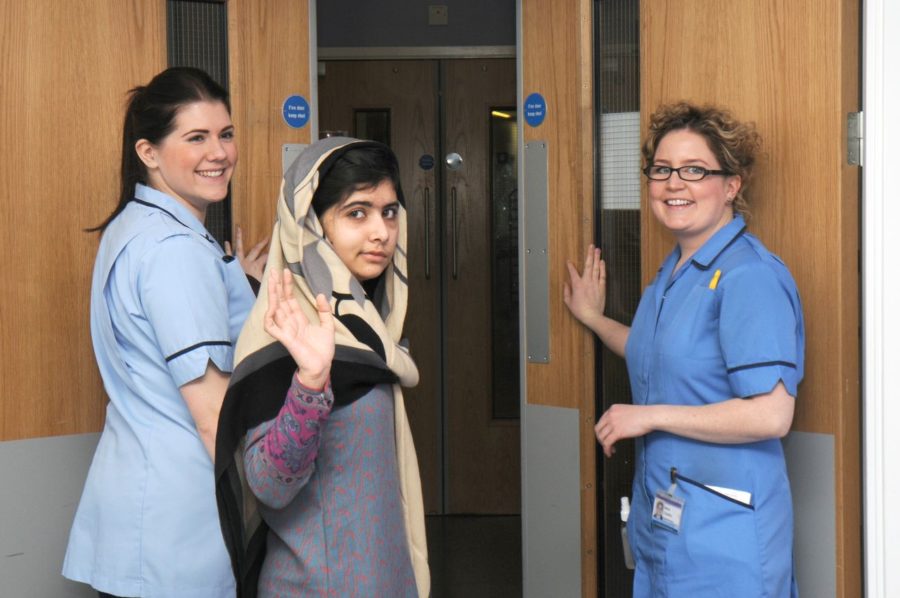Woman activist Malala Yousafzai recovering from Taliban attack
University Hospital Birmingham
Press handout- Malala Yousufzai was discharged from the Queen Elizabeth Hospital Birmingham as an inpatient (QEHB) yesterday (January 3) to continue her rehabilitation at her family’s temporary home in the West Midlands. The 15-year-old, who was shot by the Taliban for campaigning for girls’ education, is well enough to be treated by the hospital as an outpatient for the next few weeks. She is still due to be re-admitted in late January or early February to undergo cranial reconstructive surgery as part of her long-term recovery and in the meantime she will visit the hospital regularly to attend clinical appointments. Dr Dave Rosser, Medical Director, University Hospitals Birmingham NHS Foundation Trust, said: “Malala is a strong young woman and has worked hard with the people caring for her to make excellent progress in her recovery. “Following discussions with Malala and her medical team, we decided that she would benefit from being at home with her parents and two brothers. “She will return to the hospital as an outpatient and our therapies team will continue to work with her at home to supervise her onward care.” Over the past couple of weeks Malala has been leaving the hospital on a regular basis on ‘home leave’ to spend time with her father Ziauddin, mother Toorpekai and younger brothers, Khushal and Atul. During those visits assessments have been carried out by her medical team to ensure she can continue to make good progress outside the hospital. Malala was admitted to the QEHB on Monday October 15 after being flown from Pakistan where she was wounded in a school bus shooting on October 9. Loading…A number of QEHB’s multi-specialist doctors have been working alongside colleagues from Birmingham Children’s Hospital to treat her. The medical team has included clinicians from Neurosurgery, Imaging, Trauma and Therapies.
January 4, 2013
With the prospect of more surgery ahead and under the shadow of Taliban threats, courageous teen activist Malala Yousafzai was recovering at her temporary home Friday after being discharged from a British hospital.
In an attack that propelled her to global recognition, Malala was targeted in Pakistan by Taliban gunmen for speaking out in favor of education for Pakistani girls. She was left with life-threatening head and neck wounds.
Now, almost three months later, she’s on the mend but far from fully recovered.
Doctors plan to perform cranial reconstructive surgery on her within the next month, replacing a shattered portion of skull with either her own bone or a titanium plate.
The hospital released a photo to the news media showing a half-smiling Malala waving to photographers wearing a tan, gray and black scarf.
Video footage also showed her walking along a hospital corridor, her hand clasped in that of a nurse, waving goodbye to staff at the Queen Elizabeth Hospital in Birmingham — her home for nearly three months.
The transformation from images released immediately after Malala was admitted on October 15 — which showed her face bruised and a breathing tube in place — is dramatic.
Former British Prime Minister Gordon Brown and his wife welcomed her progress Friday, saying on Twitter: “Good news that Malala is well enough to leave hospital. We wish her well as her recovery continues with her family.”
“Malala is a strong young woman and has worked hard with the people caring for her to make excellent progress in her recovery, said Dr. Dave Rosser, the medical director of the University Hospitals Birmingham who’s overseen her care.
“Following discussions with Malala and her medical team, we decided that she would benefit from being at home with her parents and two brothers.”
As she recovers with her family at a house in the West Midlands, Pakistan’s consulate in Birmingham has hired Malala’s father as an education attache.
Her parents and younger brothers, Khushal and Atul, traveled to England in the fall to be with her as she goes through the long rehabilitation process.
Ziauddin Yousafzai will function as head of the consulate’s education section for three years, the Pakistani government said. His job could be extended for two additional years.
The 15-year-old became an international symbol of courage after she was shot by Taliban gunmen last fall for her crusade about girls going to school.
She had blogged fearlessly about girls’ education and accused the Taliban of thriving on ignorance. The Taliban forbid girls in the classroom and have threatened to kill anyone who defies them.
Malala was in a school van in the area on October 9 when the gunmen stopped the vehicle and demanded that other girls tell them who was Malala. They identified her. Malala was then shot, as were two other girls who survived the attack with lesser injuries.
Malala was left in a critical condition, with her father later describing her survival as a miracle.
When he left Pakistan to join his daughter, Ziauddin Yousafzai told reporters he intended to return to his native country as soon as she had recovered. It is not clear whether his appointment will mean the entire family stays long term.
At the time of his daughter’s shooting, he ran a school in Pakistan’s conservative Swat Valley that kept its doors open to girls — in defiance of the Taliban.
The attack on Malala prompted outrage and wide outpourings of support, in Pakistan and overseas.
But even as anger about her shooting intensified, the Taliban issued a statement online saying that if Malala lived, they’d come after her again.
Interior Minister Rehman Malik promised government protection if the schoolgirl does return to Pakistan. Pakistani authorities are paying for her medical care in Britain.
Since her shooting, Malala has become an international figure. She was selected as runner-up for Time magazine’s Person of the Year for 2012. CNN and Time are owned by Time Warner Inc.







